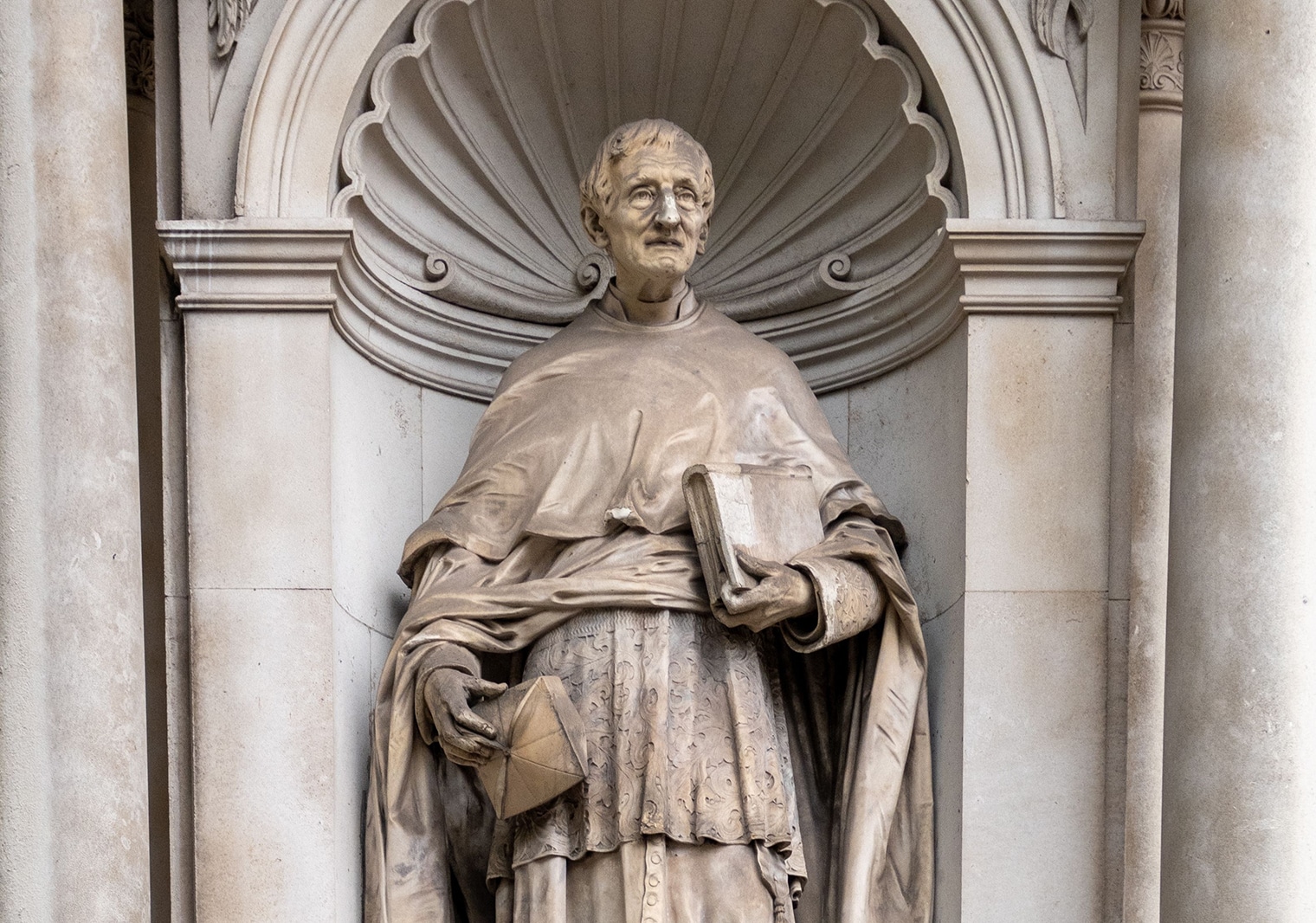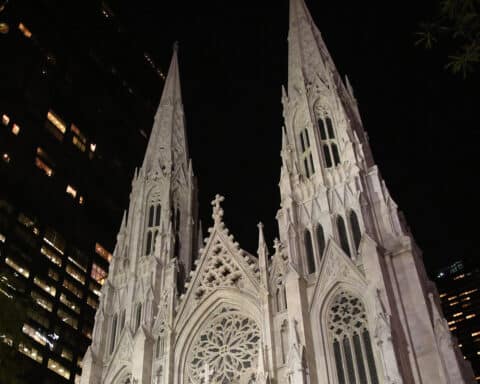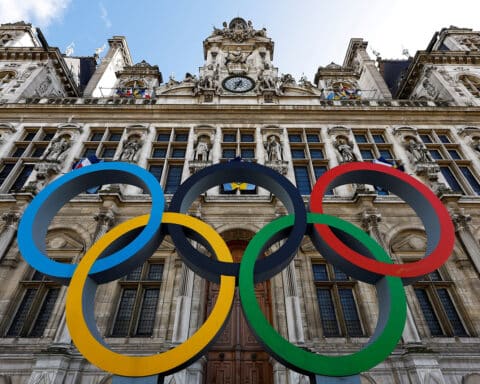BALTIMORE (OSV News) — The U.S. bishops voted almost unanimously (with two “no” votes) Nov. 15 to support a request by the Catholic Bishops’ Conference of England and Wales that Pope Francis name St. John Henry Newman, the 19th-century British cardinal, a Doctor of the Church.
Bishop Daniel E. Flores of Brownsville, Texas, chair of the doctrine committee of the U.S. Conference of Catholic Bishops, presented the question to the body of bishops. A majority of members present and voting was needed to pass the motion.
Bishop Flores said in June the conference received the request from Cardinal Vincent Nichols of Westminster, president of the Bishops’ Conference of England and Wales, requesting “that the USCCB send a letter in support of the proposal.” He noted that the conferences of the Catholic bishops of Ireland and Scotland also have agreed to support this also have agreed to support this petitionary process.
“The Committee on Doctrine considered this matter back in 2019 and concluded that the writings of St. John Henry Newman are truly eminent and of great relevance for the church today, especially in the areas of the development of doctrine, the moral foundations of education, the primacy of conscience, the role of the laity and the search for the truth, amongst many others,” Bishop Flores said. “The committee therefore determined that St. John Henry Newman is indeed worthy of this high honor.”
The question received great support from bishops from the floor, including Cardinal Seán P. O’Malley of Boston, Cardinal Daniel N. DiNardo of Galveston-Houston, Bishop Robert E. Barron of Winona-Rochester, Minnesota, and several others.
With the approval of the bishops, a letter will be sent to Pope Francis indicating their support, Bishop Flores said.
From Anglican priest to Catholic saint
Born in London in 1801, John Henry Newman was ordained an Anglican priest in 1825. He later founded the Oxford Movement, which emphasized the Catholic roots of Anglicanism.
After a series of clashes with Anglican bishops made him a virtual outcast from the Church of England, he joined the Catholic Church at age 44 and was ordained a Catholic priest in 1846.
Pope Leo XIII made him a cardinal in 1879 while respecting his wishes not to be ordained a bishop. A theologian and poet, Cardinal Newman died in 1890; his sainthood cause was opened in 1958. Pope Benedict XVI beatified him in Birmingham, England, in 2010.
Pope Francis declared Cardinal Newman a saint Oct. 13, 2019.
Doctors of the Church
If he is eventually declared a Doctor of the Church — defined by the church as a saint who, through his or her research, study and writing, has advanced the mission and teaching of Jesus Christ and his church — he would join 37 men and women who have earned that prestigious title. Most recently, Pope Francis issued a decree declaring St. Irenaeus a Doctor of the Church in January 2022. Prior to that, St. Gregory of Narek received the title in April 2015, also by Pope Francis.
The original four Doctors of the Church were St. Ambrose, St. Augustine, St. Gregory the Great and St. Jerome. Four women — St. Teresa of Avila, St. Catherine of Siena, St. Thérèse of Lisieux and St. Hildegard of Bingen — hold the title.
At a symposium held on the eve of Cardinal Newman’s canonization in 2019, Canadian Cardinal Marc Ouellet made a case for why Newman should be declared a Doctor of the Church.
“The depth of this man of God and the place he now occupies in Catholicity make us aware of the void his absence would have left if he had not been,” Cardinal Ouellet said. The cardinal particularly pointed to the new saint’s teaching that “in order to keep its integrality, the faith of the church must adapt its language to the cultural challenges and the dangers of heresy.”
Newman’s teaching on the development of doctrine held that “although the deposit (of faith) does not change, the church’s knowledge of it progresses, deepens and is expressed in a new way, always faithful to the original idea,” the cardinal said.
Cardinal Ouellet also spoke about how Cardinal Newman influenced theologians involved in the Second Vatican Council.
Rediscovering early Christianity
Father Ian Ker, author of more than 20 books about St. John Henry Newman, told Catholic News Service in Rome Oct. 12, 2019, “What’s especially important for me is this (canonization) enables him to be made a Doctor of the Church, because I believe he is the doctor par excellence of the post-conciliar period like St. Robert Bellarmine is of the Tridentine period.”
Gregory K. Hillis, a professor of theology at Bellarmine University in Louisville, Kentucky, who attended the canonization, agreed, saying that Newman’s attempts to “rediscover early Christianity and the wealth it could provide the contemporary church” had a strong impact on Vatican II’s attempts “to conserve the whole tradition, not just medieval expressions of it.”
“Newman does not fit comfortably into the traditionalist camp nor the progressive camp,” he said. “Traditionalists need to remember Newman’s willingness to speak up to the hierarchy, his willingness to draw upon more than just medieval sources, and the progressives can learn from the seriousness with which he took the tradition and engaged with it.”
Carl Olson, in an essay for OSV’s SimplyCatholic.com, said St. John Henry Newman’s theological knowledge, his masterful literary abilities and his holiness were three of the many impressive qualities of the man.
“Given Cardinal Newman’s reputation during his lifetime, both for his prodigious intellect and for his personal sanctity, support for his canonization not surprisingly began at his death. An article in America magazine in 1941, along with Pope Pius XII’s support of the 1945 ‘Centenary of Newman’s Conversion,’ played essential roles in moving the process along,” he wrote.
During a presentation by then-Cardinal Joseph Ratzinger on the occasion of the first centenary of the death of Cardinal Newman April 28, 1990, the future pope said that “throughout his entire life, Newman was a person converting, a person being transformed, and thus he always remained and became ever more himself.”
“The characteristic of the great Doctor of the Church, it seems to me, is that he teaches not only through his thought and speech but also by his life, because within him, thought and life are interpenetrated and defined. If this is so, then Newman belongs to the great teachers of the church, because he both touches our hearts and enlightens our thinking.”





